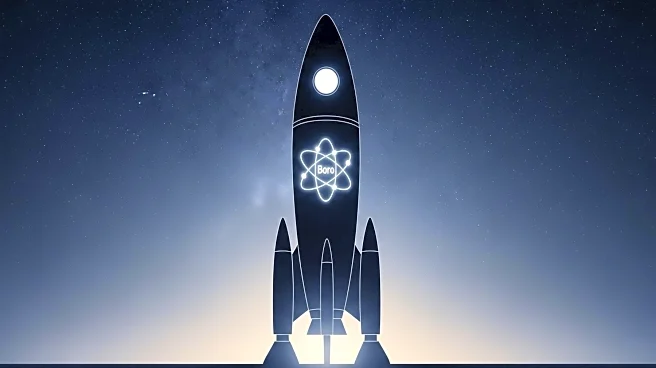What is the story about?
What's Happening?
Researchers at the University of Albany have developed a new boron-based rocket fuel compound that offers 150% more energy than traditional aluminum-based fuels. This compound, manganese diboride (MnB2), is synthesized using advanced techniques involving extreme temperatures and an arc melter. The compound's unique structure allows it to accumulate energy like a spring, releasing it during combustion. This innovation could significantly enhance payload capacity for space missions, potentially revolutionizing space travel by optimizing fuel storage and enabling spacecraft to carry heavier payloads or travel greater distances.
Why It's Important?
The development of MnB2 as a high-energy rocket fuel could transform the landscape of space exploration. Currently, a substantial portion of a rocket's mass is dedicated to fuel, limiting payload capacity. By reducing the space required for fuel storage, missions could allocate more room for essential equipment and scientific instruments. This advancement not only enhances existing missions but also opens possibilities for more ambitious endeavors, such as Mars exploration or establishing lunar bases. The compound's versatile nature also suggests potential applications in automotive catalytic converters and plastic decomposition, indicating broader industrial impacts.
What's Next?
As space agencies and private companies continue to push the boundaries of exploration, the introduction of MnB2 could be pivotal in achieving long-term goals. Researchers will likely focus on further refining the synthesis process and exploring additional applications of the compound. The potential for MnB2 to enhance propulsion efficiency and payload capacity may lead to more ambitious space missions, including those aimed at Mars exploration or lunar base establishment. Continued research and development in this area could yield additional groundbreaking technologies that shape the future of space travel.
Beyond the Headlines
The innovative approach to fuel design with MnB2 highlights the importance of chemical innovation in advancing space exploration. The compound's ability to store and release energy efficiently could address fundamental challenges in propulsion technology. Additionally, the safe handling and ignition requirements of MnB2 ensure its practicality for various applications, underscoring its potential impact across industries. As researchers explore the possibilities, this development may inspire further advancements in fuel technology and propulsion systems, contributing to the broader goals of interstellar travel and exploration.















